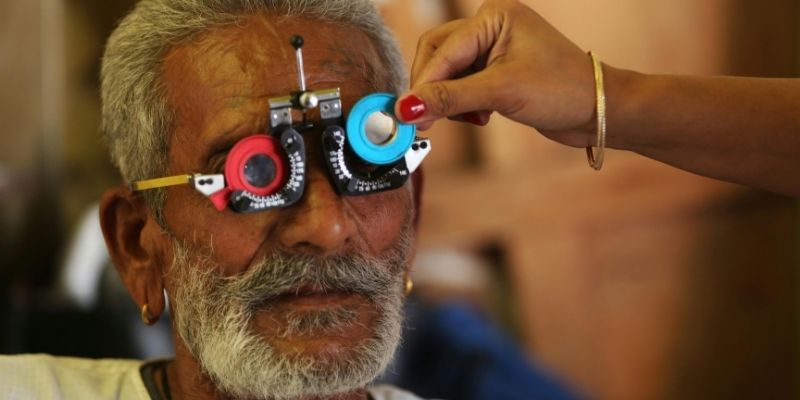Eye exam for Alzheimer's disease: Can it detect early signs?
Alzheimer’s is a progressive disease that affects one’s memory, thinking, and everyday activities. It is thought to be a brain disorder, but recent research has suggested that eye health may play an important role regarding its onset. Some researchers have found out that an eye test can be used for preliminary Alzheimer’s diagnosis because some processes in the retina can indicate the presence of early Alzheimer’s. The question still exists, can an eye doctor make an early diagnosis of Alzheimer’s disease during the absence of symptoms?

How Alzheimer's Disease Affects the Brain
Recognizing the effects of Alzheimer’s is the first step towards understanding the illness. Abnormal deposits of proteins in the brain impact how nerve cells communicate, and this is what causes the disease. The aforementioned changes result in the reduction in size of a few brain regions, which ultimately results in loss of memory and cognitive functions. Scientists suggest that the relationship between the brain and the eyes can help provide an explanation for the impacts and development of Alzheimer’s; hence, studying changes in the retina could be helpful.
The Role of Eye Care Professionals in Alzheimer’s Research
As research on the link between eye health and Alzheimer’s disease continues to evolve, eye care professionals may play a more significant role in early detection. Ophthalmologists and optometrists, who regularly examine patients’ eyes, could help identify subtle retinal changes associated with cognitive decline. Routine eye exams could serve as a first step in screening at-risk individuals, leading to further neurological evaluations when necessary. This collaboration between eye doctors and neurologists could refine Alzheimer’s diagnostic methods, ensuring patients receive timely interventions.
Challenges and Future Prospects in Eye-Based Alzheimer’s Detection
Although the eye exams show great potential, there is still a long way to go before they can be combined with Alzheimer’s procedures. Extensive clinical research is needed to validate changes in the retina as reliable biomarkers for Alzheimer’s disease. In addition, implementing advanced technology such as OCTA into standard eye examinations will require significant improvements in cost and functionality. On the other hand, many studies are currently being conducted to make these techniques more accurate, which will bring us one step closer to a world where a basic eye exam could be instrumental at diagnosing Alzheimer’s at an early stage and improving treatment results.
Can an Eye Exam Predict Alzheimer’s?
Verticals involving the imaging of the eye have immensely progressed, allowing for unprecedented studies on the retina. A specific scan called Optical Coherence Tomography Angiography (OCTA) allows practitioners to view the smallest blood vessels in the eye. Early research on patients with Alzheimer’s suggests that during its moderately advanced stages there is reduced blood vessel density in the retina. This means that there is a possibility of utilizing Alzheimer's as a modality for screening cognitive patients before more prominent signs appear.
The Role of Retinal Scans in Early Diagnosis
Conventional diagnostic approaches for Alzheimer's, including brain imaging and cerebrospinal fluid assessments, are often expensive and invasive. Conversely, retinal scans present a rapid, non-invasive, and cost-effective alternative. By evaluating the retinal thickness and the state of associated blood vessels, healthcare professionals can detect potential early indicators of the disease. While eye examinations are not currently conclusive tests for Alzheimer's, they may assist in identifying individuals at increased risk.
What Research Says About Eye Exams and Alzheimer’s
Researchers from Ophthalmology Retina documented major abnormalities within retinal blood vessels in Alzheimer’s patients versus normal subjects in their clinical study. The Duke Eye Center discovered retinal defects in patients who displayed symptoms of mild cognitive impairment before Alzheimer's development. The discovery of retinal blood vessel changes provides strong evidence that eye testing might eventually establish itself as a standard procedure in early Alzheimer's diagnosis.
Other Tests to Diagnose Alzheimer’s Disease
Eye examinations demonstrate potential diagnostic capability but they do not represent the only Alzheimer's detection method. The detection of Alzheimer’s requires that doctors perform multiple assessments simultaneously. The essential tools used for diagnosis include cognitive tests alongside MRI and PET scans and spinal fluid analysis tests. Research is underway to establish blood testing as a diagnostic procedure for Alzheimer’s disease. Researchers believe retinal scans will develop into an easy procedure that detects people requiring neurological exams within the next few years.
Can Early Detection Help Prevent Alzheimer's?
Medical science does not offer any treatment for Alzheimer’s disease yet however early diagnosis enables better control of the illness. Studies have proved that patients who follow heart-healthy diets alongside blood pressure control and exercise programs show reduced risk for cognitive deterioration. Eye examination tests that identify at-risk people during earlier stages could start preventive interventions which might prevent disease progression.

The Future of Alzheimer’s Detection Through Eye Exams
Scientific researchers currently investigate the significant ties which exist between eye health and brain functions. The future development of technology will turn eye exams into regular assessments during Alzheimer's screening procedures enabling people to identify risks in a non-invasive manner. The current research findings about eye exams point towards earlier Alzheimer’s diagnosis alongside improved disease management although additional study is required for confirmation.
Eye exam research continues to explore its capability to find Alzheimer’s disease in emergent phases. Research using retinal scans has established promising knowledge which may lead to standalone diagnostic systems in the future. Future precaution and treatment of Alzheimer's disease may include regular eye tests because scientists continue to research this connection.
Conclusion:
The link between eye health and Alzheimer’s disease offers new possibilities for early detection. Research suggests retinal changes may signal warning signs before diagnosis, though eye exams alone cannot yet confirm the disease. However, routine eye exams could become a vital screening tool, allowing for earlier interventions. Ongoing research aims to develop tests to diagnose Alzheimer’s that are more accessible and less invasive. Identifying the causes of Alzheimer’s early can improve patient care and offer hope for better disease management and potential preventive strategies in the future.










